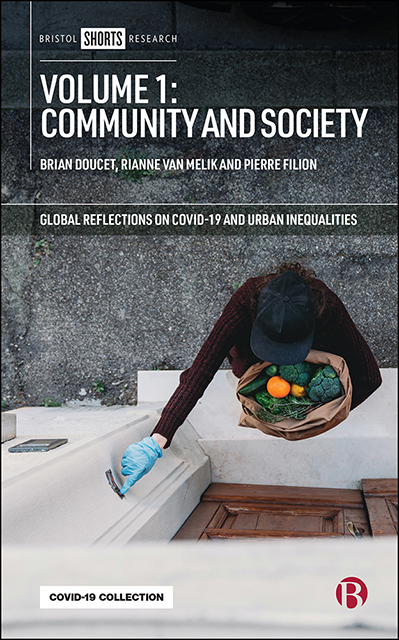Book contents
- Frontmatter
- Contents
- List of Figures and Tables
- Notes on Contributors
- Acknowledgments
- Preface to All Four Volumes of Global Reflections on COVID-19 and Urban Inequalities
- One Introduction
- Part I Working Practices
- Part II Life During Lockdown
- Part III Migration, Migrants, and Refugees
- Part IV Age, Race, Gender, and Ability
- Index
Thirteen - Liminality, Gender, and Ethnic Dynamics in Urban Space: COVID-19 and its Consequences for Young Female Migrants (YFM) in Dhaka
Published online by Cambridge University Press: 13 April 2023
- Frontmatter
- Contents
- List of Figures and Tables
- Notes on Contributors
- Acknowledgments
- Preface to All Four Volumes of Global Reflections on COVID-19 and Urban Inequalities
- One Introduction
- Part I Working Practices
- Part II Life During Lockdown
- Part III Migration, Migrants, and Refugees
- Part IV Age, Race, Gender, and Ability
- Index
Summary
Introduction
This chapter presents the changing situation of female workers in the Ready-Made Garment industry (RMG) and the beauty parlor sector in Dhaka, the capital city of Bangladesh, as an outcome of the COVID-19-virus/crisis. Both sectors predominantly employ women. Before the pandemic, there were nearly four thousand active RMG factories in Bangladesh, employing a total of 3.5 million workers. Approximately 60 percent were female and 40 percent were male. In 2009, the personal care industry was reported to employ about 100,000 women in about 2,000 registered beauty parlors, mainly in urban areas all over the country (see Grabska et al, 2015: 64). The beauty parlor sector is known for many of its employees being Garo, one of Bangladesh's 50 officially recognized indigenous minorities. The Garos, who are predominantly Christian, had a distinctive advantage in particular job opportunities in cities, such as nursing or hairdressing, which used to be regarded as polluting both by Muslims and Hindus (Bal, 2007; Raitapuro and Bal, 2016). This chapter is based on several online conversations with different partners currently situated in Bangladesh, and the results of an in-depth ethnographic research project on young female migrants in Dhaka, which we carried out from March 2016 to October 2018.
For more than 20 years, women's presence in the urbanscape of Dhaka increased exponentially, completely changing the face of this urban space. A recent study noted that before COVID-19, three out of every five migrants from rural areas were female, signifying a remarkable shift from the traditional male dominance in the labor force in urban areas. The job opportunities that opened up for young women in the RMG industry since the 1980s, and especially after the turn of the century in particular, are a key factor in this migration.
Pandemics are known to reproduce and exacerbate existing social inequalities present in society (Lokot and Avakyan, 2020). In this chapter, we will trace the trail of responses that COVID-19 has provoked for women working in the RMG and beauty parlor sectors. It will become clear that even though the working conditions and their positions in society differ greatly, the consequences of COVID-19 for these marginalized groups of female workers affect them in similarly harsh ways.
- Type
- Chapter
- Information
- Volume 1: Community and Society , pp. 143 - 154Publisher: Bristol University PressPrint publication year: 2021



